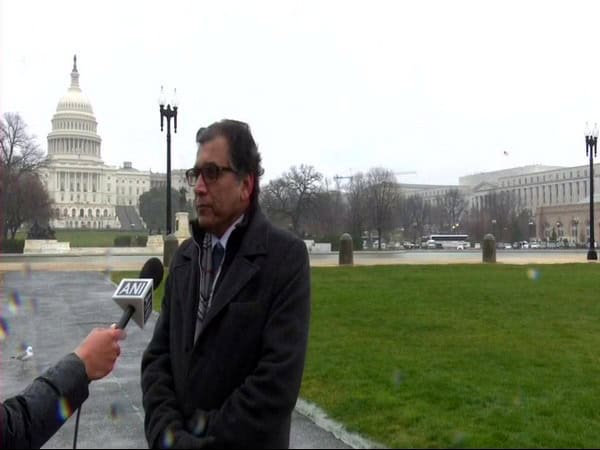Washington: Mohajirs– Muslims who migrated to Pakistan from India during post-partition period– demand redrawing of geographical boundaries in Pakistan in line with the true spirit of the 1940 Lahore Resolution and according to the aspirations of the country’s ethnic groups.
This was stated by Nadeem Nusrat, former convener of Muttahida Qaumi Movement (MQM) and spokesperson for the ‘ Free Karachi ‘ campaign, in a special message on the Pakistan Day”>Pakistan Day.
The Pakistan Day”>Pakistan Day is celebrated on March 23 to commemorate the famous Lahore Resolution. The Lahore Resolution (Qarardad-e-Lahore), also known as the Pakistan Resolution (Qarardad-e-Pakistan) was a political resolution drafted between March 22 to 24, 1940, by the 25-member Working Committee of the All-India Muslim League, and was then formally adopted by the Muslim League membership at its general session on March 23,1940, held at Lahore.
This resolution had asked for greater Muslim autonomy within British India.
In a statement issued by the ‘ Free Karachi ‘ campaign, Nusrat said that Muslims in India had supported its partition only to achieve freedom, equality and all other human rights in their new homeland. Pakistan, however, has miserably failed to deliver even the basic human rights to its citizens.
Ethnic Bengalis have been denied their rights since the breakup of Pakistan in 1971; it is Mohajirs, Balochs, Pashtuns, Hazaras, people of Gilgit-Baltistan and religious minorities who are being victimised by Punjabi elite and military establishment.
Nusrat reminded that the 1940 Resolution had categorically and unequivocally called for the formation of autonomous “Independent States” in India, and not a single Muslim State.
He said that the original resolution was highly pragmatic and sensible in its demand for the creation of “Independent States”, as the Muslim-majority areas which became part of Pakistan were culturally and ethnically diverse. Even after 70 years of its existence and despite state-sponsored efforts to use religion as a binding force to create national unity in Pakistan, the country remains as ethnically divided and polarised as it could get, he reiterated.
The ‘Free Karachi’ campaign spokesperson further highlighted that in its state-sponsored cultural shows, Pakistan presents itself as a country of many cultures and languages. This diversity, however, does not reflect in the running of the country. Every institution in Pakistan is dominated by people from one province, Punjab. The resources of smaller province are plundered by the Punjabi establishment.
Pakistan at the moment is bleeding at the hands of its own security forces, whose overwhelming majority hails from Punjab. The country needs a complete overhaul as well as geographical restructuring, he added.
The only way for Pakistan to become a viable state is to afford its ethnic minority’s equal representation in the parliament, national policy-making process as well as in the armed forces, Nusrat stressed.
The dominance of one ethnic group, the Punjabis, must come to an end now. 70-millions Mohajirs, whose forefathers played the decisive part during the movement to create Pakistan, also need administrative autonomy in areas where they form majority, he said.
Nusrat said that Karachi, the main majority city in Pakistan, has been colonised by Punjabi military and Sindhi feudal lords, both of whom are busy looting the city and gradually handing over its financial and industrial institutions to the Chinese.
The turmoil that Pakistan is facing today can only be addressed by forming many autonomous states and by ensuring equal participation of all ethnic and religious groups in the affairs of the country, the spokesperson said.
Nusrat believed that creation of such autonomous states will guarantee the national unity, peace and stability and will also weaken the forces of religious extremism that at the moment enjoy unbridled support from Pakistan’s military establishment.
He added that the ethnic fault lines in Pakistan have deepened further in the last few years, as rights movements in Karachi, other areas of urban Sindh, Balochistan, KPK and FATA are becoming more visible and vocal despite the inhuman practices of Pakistan army to suppress them.
In fact, Pakistani military establishment’s excessive use of force in non-Punjabi areas is fanning separatist forces in Pakistan. The only thing that could save Pakistan from completely falling apart is the creation of many autonomous states with a loose federation, he said.
Nusrat said that this is a final wake up call for Pakistan to address its policies which are based on racism, discrimination and persecution.
He urged the policymaking institutions of the country to listen to the grievances of ethnic groups and immediately announce a powerful commission to work on the re-drawing of geographical boundaries according to the aspirations of ethnic groups and in line with the original Lahore Resolution of 1940. (ANI)

